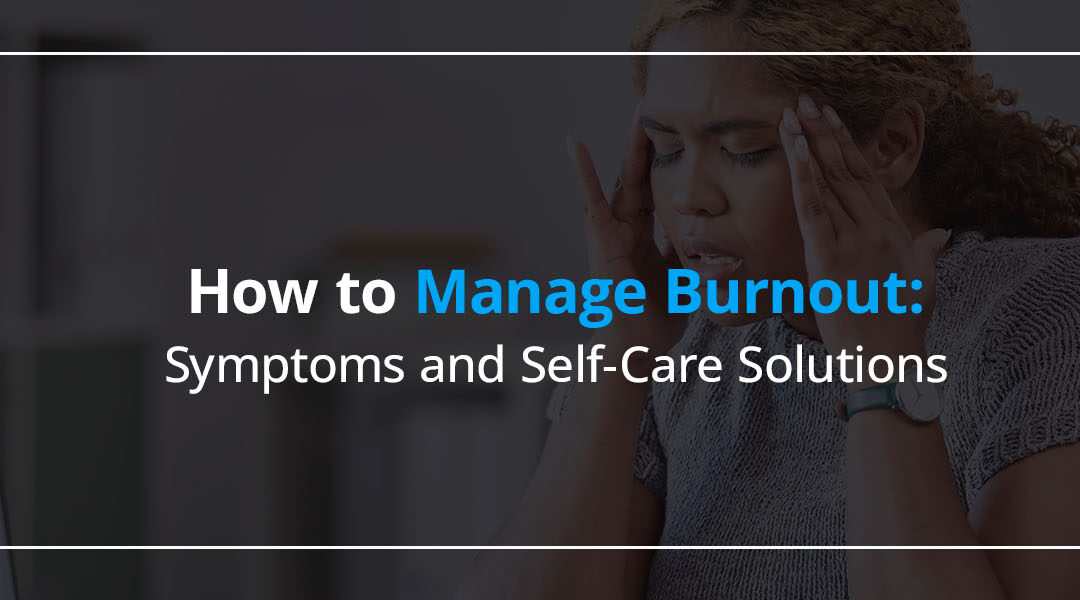Burnout is a common occurrence that can happen to anyone. It happens when stress and pressure reach a tipping point, resulting in exhaustion, emptiness and difficulty getting through daily life. Anyone exposed to a stressful environment for a prolonged period can struggle with burnout, from employees to students. Many forms of self-care can help you overcome burnout and start feeling better, from taking more breaks and pampering yourself to reaching out to friends, family or professionals.
What Is Burnout?
Burnout is the feeling of emotional, mental or physical exhaustion that occurs due to overwork. Working too hard, too much or for too long can take a significant toll on your mind and body — sometimes without you even noticing it. Take note if you’ve become exhausted every day, you feel like nothing you do makes a difference, or caring about work or home feels like a waste of energy. These are all signs you’re on the verge of job burnout.
Having little to no control over your workload, receiving little to no recognition for a job well done, unclear task expectations and high-pressure environments can all increase your risk of burnout. A lack of healthy coping skills and personality traits like perfectionism can also be risk factors.
A recent study revealed over 40% of workers experience burnout. While anyone who faces chronic stress can develop burnout, some are more at risk, such as first responders and those in health care. Burnout can make it difficult to function in everyday life if left unaddressed.
8 Symptoms of Burnout
Learning the symptoms and warning signs of burnout can help you better understand yourself and whether stress might be impacting you negatively. Here are mental, emotional and physical burnout symptoms:
- Fatigue and exhaustion: Burnout feels like extreme fatigue, exhaustion and overall tiredness. It can have an immense impact on your physical health, causing high blood pressure, reoccurring headaches and muscle tension throughout the body.
- Gastrointestinal problems: Stress and burnout often go hand in hand with gastrointestinal health. A study found people with burnout had higher levels of nausea, gas, indigestion, diarrhea and constipation.
- Sleep issues: There is a strong association between job burnout and insomnia. Studies have found mounting work pressure and stress can result in difficulties falling or staying asleep, which can exacerbate burnout.
- Trouble concentrating: It’s common to lose your ability to focus when burnout starts. Being overwhelmed can make it more challenging to sustain your attention, leading to reduced productivity and causing a cycle.
- Poor immune function: Numerous studies find a connection between job burnout and immune system disorders like lupus.
- Feelings of worthlessness: Burnout can lead to depression and feelings of worthlessness. You might feel like what you are doing is never enough, causing a cycle of frustration, burnout and sadness.
- Negativism or cynicism related to your job: Over time, being overworked can lead to cynicism and negative feelings toward your career. You might experience more anger, irritability or feelings of hopelessness at work.
- Loss of interest or pleasure: Mental burnout can manifest as a loss of interest or pleasure in activities that once brought you joy.
Leaving the above burnout symptoms unaddressed can magnify them and lead to reduced work performance, depression and an inability to function in everyday life. Burnout can make simple tasks like getting up in the morning seem exhausting or nearly impossible. It can impact your personal and professional life, resulting in cynicism and less meaningfulness.
6 Self-Care Solutions for Burnout
The good news is that burnout is reversible. Changes to your work environment and taking care of yourself can all help you overcome burnout and start feeling better personally and professionally. Here are some self-care solutions that might help you deal with burnout:
1. Do What Makes You Happy
Severe burnout can make it difficult to experience pleasure from your favorite activities. Try to remember what once brought you joy and create a list. Activities might include:
- Long walks with a pet.
- Reading a book in the tub.
- Taking your child to the park.
- Creating art.
Make time for these activities every week — you might reduce burnout-related stress over time. Prioritize the things that bring you joy and keep the habit going even after you start feeling more like yourself.
2. Get Active and Eat a Healthy Diet
Exercise can combat stress and burnout and boost your mood. Try to move, get active for at least 30 minutes daily and do activities you enjoy to keep the habit going. Going for a walk, swimming or even dancing counts toward exercise and relieves stress.
At the same time, it’s crucial to eat foods that are good for you to care for your physical and mental health. Minimize sugar and refined carbs and eat omega-3 fatty acids, which can boost your mood. Only drink alcohol in moderation, as it can lead to anxiety.
3. Engage in Healthy Sleep Habits
Feeling tired can exacerbate burnout, though burnout can also be a huge cause of insomnia and sleep troubles. To stop the cycle, focus on getting better quality sleep with these tips:
- Go to bed at the same time every night.
- Limit electronic use before bed.
- Use an eye mask or blackout curtains to shield outside light.
- Use a white noise machine to block out sounds.
- Create a cozier bedroom with supportive pillows and blankets.
4. Set Healthy Boundaries
It’s also important to set healthy boundaries at work to reduce job burnout. For example, you might approach human resources about the problems you’re experiencing, switch job tasks or talk to a supervisor if your company is invested in creating a healthier work environment.
Additionally, set limits on the time you give others and establish a better work-life balance by leaving your tasks at work. Pay attention to your feelings and physical needs and schedule regular breaks throughout the workday. Remember that you can’t do everything yourself, so when you’re given more tasks than you can handle, pass them off to someone you trust.
5. Talk to People You Trust
While opening up about your struggles initially seems complicated, dealing with burnout alone can be even more challenging. Involved loved ones like a partner, friend or family member might help you feel more supported and less alone. Plus, you never know, loved ones might have experienced burnout themselves and have valuable insight to share with you.
6. Reach Out for Professional Support
Burnout can become overwhelming and make addressing it seem exhausting. It can also be challenging to find potential solutions when it’s taken a toll on your physical and emotional health. When you need extra help to find your way out of burnout, or you’re also dealing with depression or anxiety, professional burnout treatment can help.
In therapy, you can discuss your burnout symptoms, and mental health professionals can help you find strategies that work best for you. Professional support is often crucial, as you can gain more clarity on what you need to overcome burnout and start feeling better.
We Can Provide Support for Burnout
Burnout can have an immense impact on your physical health and emotional well-being. At Merrimack Valley Psychological Associates, we understand that stress and pressure impact everyone differently. We tailor our approaches to each patient, helping you find the right solution for your unique experience and needs.
As mental health professionals, we are dedicated to being your support system as you embark on your journey to life balance. Whether you are dealing with burnout, depression, stress or anxiety, we can offer the support you need to heal and move forward. Contact us today to get started or learn more about our services.



